LAW00150 - Contract Law Problems in Business Law Assignment
VerifiedAdded on 2023/06/13
|9
|2635
|216
Homework Assignment
AI Summary
This assignment provides solutions to several contract law problems. The first problem analyzes whether an agreement between family members is intended to create a legal relation, referencing Balfour v Balfour and Parker v Clarke. The second problem examines past consideration versus implied promises to pay, citing Roscorla v Thomas and Pao On v Lau Yiu Long. The third problem addresses part-payments of debts, referencing Pinnel's Case, Foakes v Beer, and Antons Trawling Co Ltd v Smith. The fourth problem discusses the incorporation of onerous terms in a contract, referencing Interfoto Picture Library v Stilletto. The fifth problem covers the validity of an exclusion clause in a signed document, citing Curtis V Chemical Cleaning Co and L'Estrange V Graucob. Finally, the sixth problem considers reliance on statements or advice provided by a party with special skills, referencing the Goods Act 1958 (Vic) and Dick Bentley Productions v Harold Smith Motors. Each problem identifies the legal issues, relevant laws, case laws, and provides a reasoned conclusion.
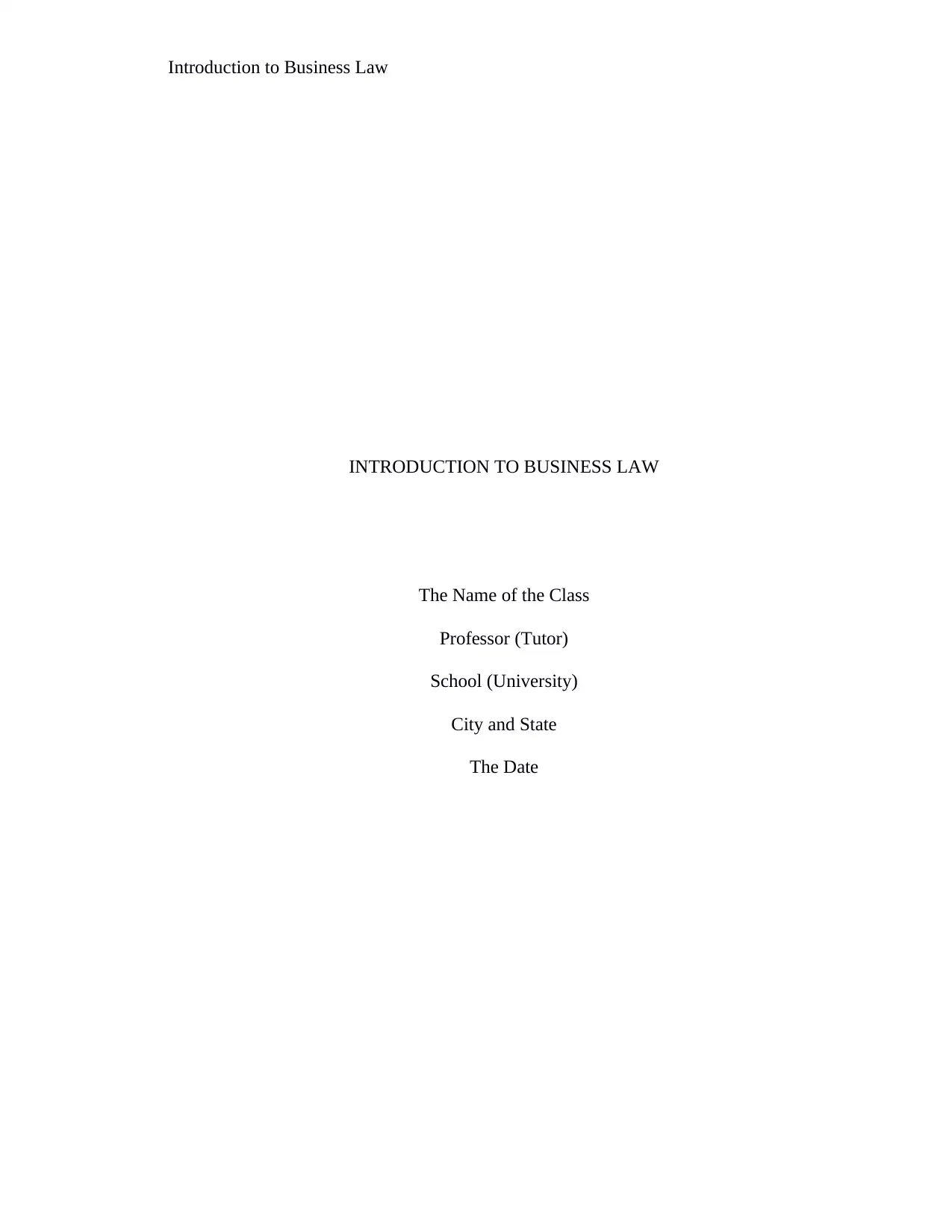
Introduction to Business Law
INTRODUCTION TO BUSINESS LAW
The Name of the Class
Professor (Tutor)
School (University)
City and State
The Date
INTRODUCTION TO BUSINESS LAW
The Name of the Class
Professor (Tutor)
School (University)
City and State
The Date
Paraphrase This Document
Need a fresh take? Get an instant paraphrase of this document with our AI Paraphraser
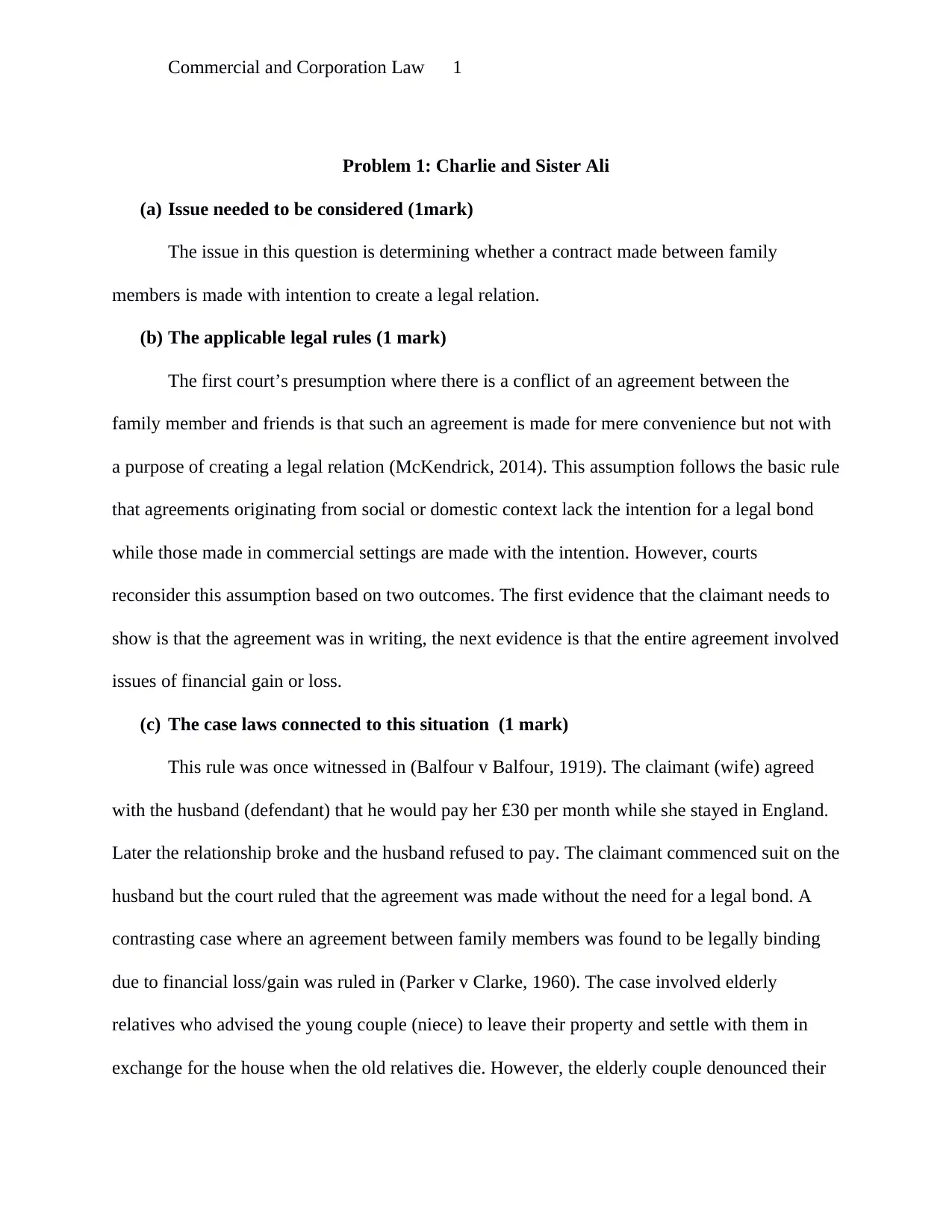
Commercial and Corporation Law 1
Problem 1: Charlie and Sister Ali
(a) Issue needed to be considered (1mark)
The issue in this question is determining whether a contract made between family
members is made with intention to create a legal relation.
(b) The applicable legal rules (1 mark)
The first court’s presumption where there is a conflict of an agreement between the
family member and friends is that such an agreement is made for mere convenience but not with
a purpose of creating a legal relation (McKendrick, 2014). This assumption follows the basic rule
that agreements originating from social or domestic context lack the intention for a legal bond
while those made in commercial settings are made with the intention. However, courts
reconsider this assumption based on two outcomes. The first evidence that the claimant needs to
show is that the agreement was in writing, the next evidence is that the entire agreement involved
issues of financial gain or loss.
(c) The case laws connected to this situation (1 mark)
This rule was once witnessed in (Balfour v Balfour, 1919). The claimant (wife) agreed
with the husband (defendant) that he would pay her £30 per month while she stayed in England.
Later the relationship broke and the husband refused to pay. The claimant commenced suit on the
husband but the court ruled that the agreement was made without the need for a legal bond. A
contrasting case where an agreement between family members was found to be legally binding
due to financial loss/gain was ruled in (Parker v Clarke, 1960). The case involved elderly
relatives who advised the young couple (niece) to leave their property and settle with them in
exchange for the house when the old relatives die. However, the elderly couple denounced their
Problem 1: Charlie and Sister Ali
(a) Issue needed to be considered (1mark)
The issue in this question is determining whether a contract made between family
members is made with intention to create a legal relation.
(b) The applicable legal rules (1 mark)
The first court’s presumption where there is a conflict of an agreement between the
family member and friends is that such an agreement is made for mere convenience but not with
a purpose of creating a legal relation (McKendrick, 2014). This assumption follows the basic rule
that agreements originating from social or domestic context lack the intention for a legal bond
while those made in commercial settings are made with the intention. However, courts
reconsider this assumption based on two outcomes. The first evidence that the claimant needs to
show is that the agreement was in writing, the next evidence is that the entire agreement involved
issues of financial gain or loss.
(c) The case laws connected to this situation (1 mark)
This rule was once witnessed in (Balfour v Balfour, 1919). The claimant (wife) agreed
with the husband (defendant) that he would pay her £30 per month while she stayed in England.
Later the relationship broke and the husband refused to pay. The claimant commenced suit on the
husband but the court ruled that the agreement was made without the need for a legal bond. A
contrasting case where an agreement between family members was found to be legally binding
due to financial loss/gain was ruled in (Parker v Clarke, 1960). The case involved elderly
relatives who advised the young couple (niece) to leave their property and settle with them in
exchange for the house when the old relatives die. However, the elderly couple denounced their
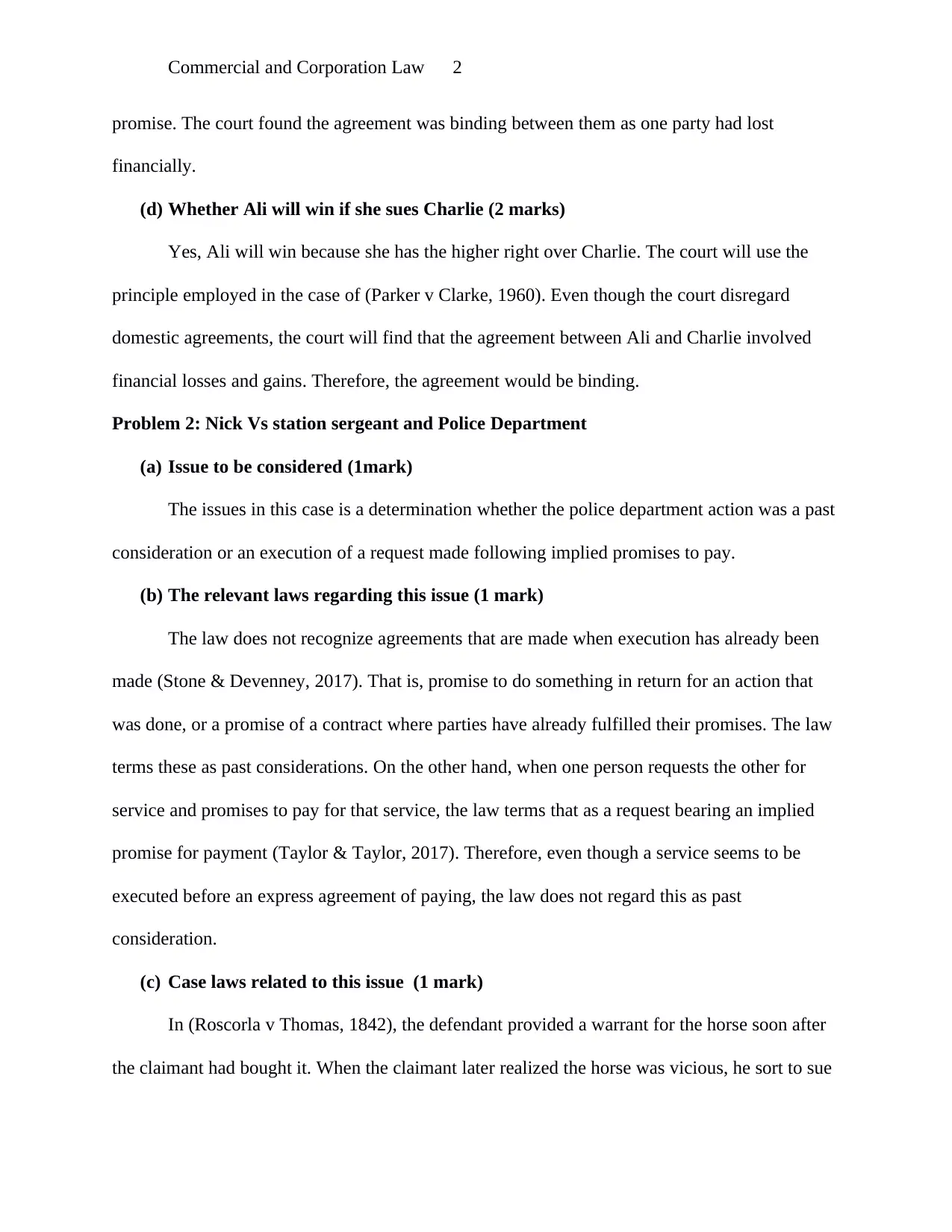
Commercial and Corporation Law 2
promise. The court found the agreement was binding between them as one party had lost
financially.
(d) Whether Ali will win if she sues Charlie (2 marks)
Yes, Ali will win because she has the higher right over Charlie. The court will use the
principle employed in the case of (Parker v Clarke, 1960). Even though the court disregard
domestic agreements, the court will find that the agreement between Ali and Charlie involved
financial losses and gains. Therefore, the agreement would be binding.
Problem 2: Nick Vs station sergeant and Police Department
(a) Issue to be considered (1mark)
The issues in this case is a determination whether the police department action was a past
consideration or an execution of a request made following implied promises to pay.
(b) The relevant laws regarding this issue (1 mark)
The law does not recognize agreements that are made when execution has already been
made (Stone & Devenney, 2017). That is, promise to do something in return for an action that
was done, or a promise of a contract where parties have already fulfilled their promises. The law
terms these as past considerations. On the other hand, when one person requests the other for
service and promises to pay for that service, the law terms that as a request bearing an implied
promise for payment (Taylor & Taylor, 2017). Therefore, even though a service seems to be
executed before an express agreement of paying, the law does not regard this as past
consideration.
(c) Case laws related to this issue (1 mark)
In (Roscorla v Thomas, 1842), the defendant provided a warrant for the horse soon after
the claimant had bought it. When the claimant later realized the horse was vicious, he sort to sue
promise. The court found the agreement was binding between them as one party had lost
financially.
(d) Whether Ali will win if she sues Charlie (2 marks)
Yes, Ali will win because she has the higher right over Charlie. The court will use the
principle employed in the case of (Parker v Clarke, 1960). Even though the court disregard
domestic agreements, the court will find that the agreement between Ali and Charlie involved
financial losses and gains. Therefore, the agreement would be binding.
Problem 2: Nick Vs station sergeant and Police Department
(a) Issue to be considered (1mark)
The issues in this case is a determination whether the police department action was a past
consideration or an execution of a request made following implied promises to pay.
(b) The relevant laws regarding this issue (1 mark)
The law does not recognize agreements that are made when execution has already been
made (Stone & Devenney, 2017). That is, promise to do something in return for an action that
was done, or a promise of a contract where parties have already fulfilled their promises. The law
terms these as past considerations. On the other hand, when one person requests the other for
service and promises to pay for that service, the law terms that as a request bearing an implied
promise for payment (Taylor & Taylor, 2017). Therefore, even though a service seems to be
executed before an express agreement of paying, the law does not regard this as past
consideration.
(c) Case laws related to this issue (1 mark)
In (Roscorla v Thomas, 1842), the defendant provided a warrant for the horse soon after
the claimant had bought it. When the claimant later realized the horse was vicious, he sort to sue
⊘ This is a preview!⊘
Do you want full access?
Subscribe today to unlock all pages.

Trusted by 1+ million students worldwide
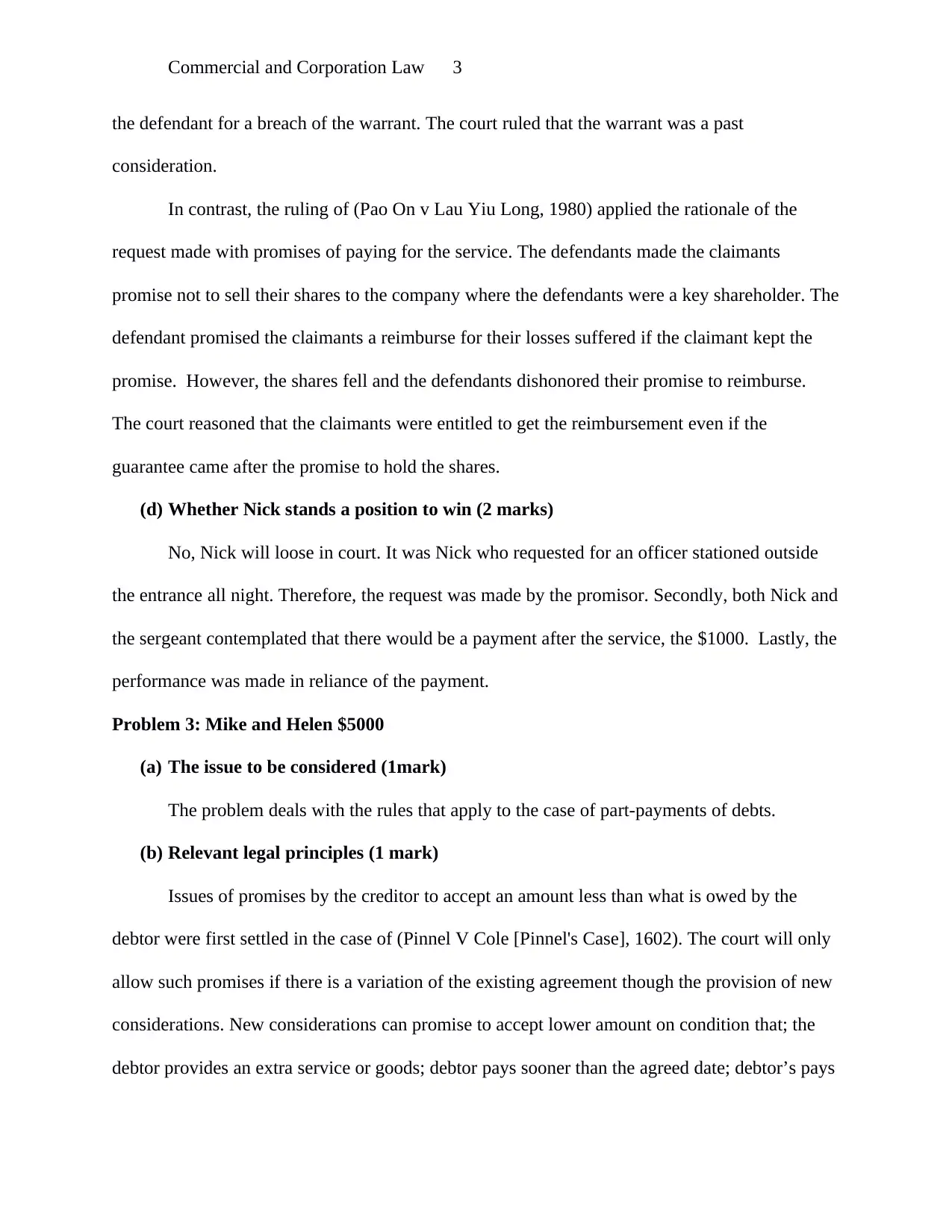
Commercial and Corporation Law 3
the defendant for a breach of the warrant. The court ruled that the warrant was a past
consideration.
In contrast, the ruling of (Pao On v Lau Yiu Long, 1980) applied the rationale of the
request made with promises of paying for the service. The defendants made the claimants
promise not to sell their shares to the company where the defendants were a key shareholder. The
defendant promised the claimants a reimburse for their losses suffered if the claimant kept the
promise. However, the shares fell and the defendants dishonored their promise to reimburse.
The court reasoned that the claimants were entitled to get the reimbursement even if the
guarantee came after the promise to hold the shares.
(d) Whether Nick stands a position to win (2 marks)
No, Nick will loose in court. It was Nick who requested for an officer stationed outside
the entrance all night. Therefore, the request was made by the promisor. Secondly, both Nick and
the sergeant contemplated that there would be a payment after the service, the $1000. Lastly, the
performance was made in reliance of the payment.
Problem 3: Mike and Helen $5000
(a) The issue to be considered (1mark)
The problem deals with the rules that apply to the case of part-payments of debts.
(b) Relevant legal principles (1 mark)
Issues of promises by the creditor to accept an amount less than what is owed by the
debtor were first settled in the case of (Pinnel V Cole [Pinnel's Case], 1602). The court will only
allow such promises if there is a variation of the existing agreement though the provision of new
considerations. New considerations can promise to accept lower amount on condition that; the
debtor provides an extra service or goods; debtor pays sooner than the agreed date; debtor’s pays
the defendant for a breach of the warrant. The court ruled that the warrant was a past
consideration.
In contrast, the ruling of (Pao On v Lau Yiu Long, 1980) applied the rationale of the
request made with promises of paying for the service. The defendants made the claimants
promise not to sell their shares to the company where the defendants were a key shareholder. The
defendant promised the claimants a reimburse for their losses suffered if the claimant kept the
promise. However, the shares fell and the defendants dishonored their promise to reimburse.
The court reasoned that the claimants were entitled to get the reimbursement even if the
guarantee came after the promise to hold the shares.
(d) Whether Nick stands a position to win (2 marks)
No, Nick will loose in court. It was Nick who requested for an officer stationed outside
the entrance all night. Therefore, the request was made by the promisor. Secondly, both Nick and
the sergeant contemplated that there would be a payment after the service, the $1000. Lastly, the
performance was made in reliance of the payment.
Problem 3: Mike and Helen $5000
(a) The issue to be considered (1mark)
The problem deals with the rules that apply to the case of part-payments of debts.
(b) Relevant legal principles (1 mark)
Issues of promises by the creditor to accept an amount less than what is owed by the
debtor were first settled in the case of (Pinnel V Cole [Pinnel's Case], 1602). The court will only
allow such promises if there is a variation of the existing agreement though the provision of new
considerations. New considerations can promise to accept lower amount on condition that; the
debtor provides an extra service or goods; debtor pays sooner than the agreed date; debtor’s pays
Paraphrase This Document
Need a fresh take? Get an instant paraphrase of this document with our AI Paraphraser
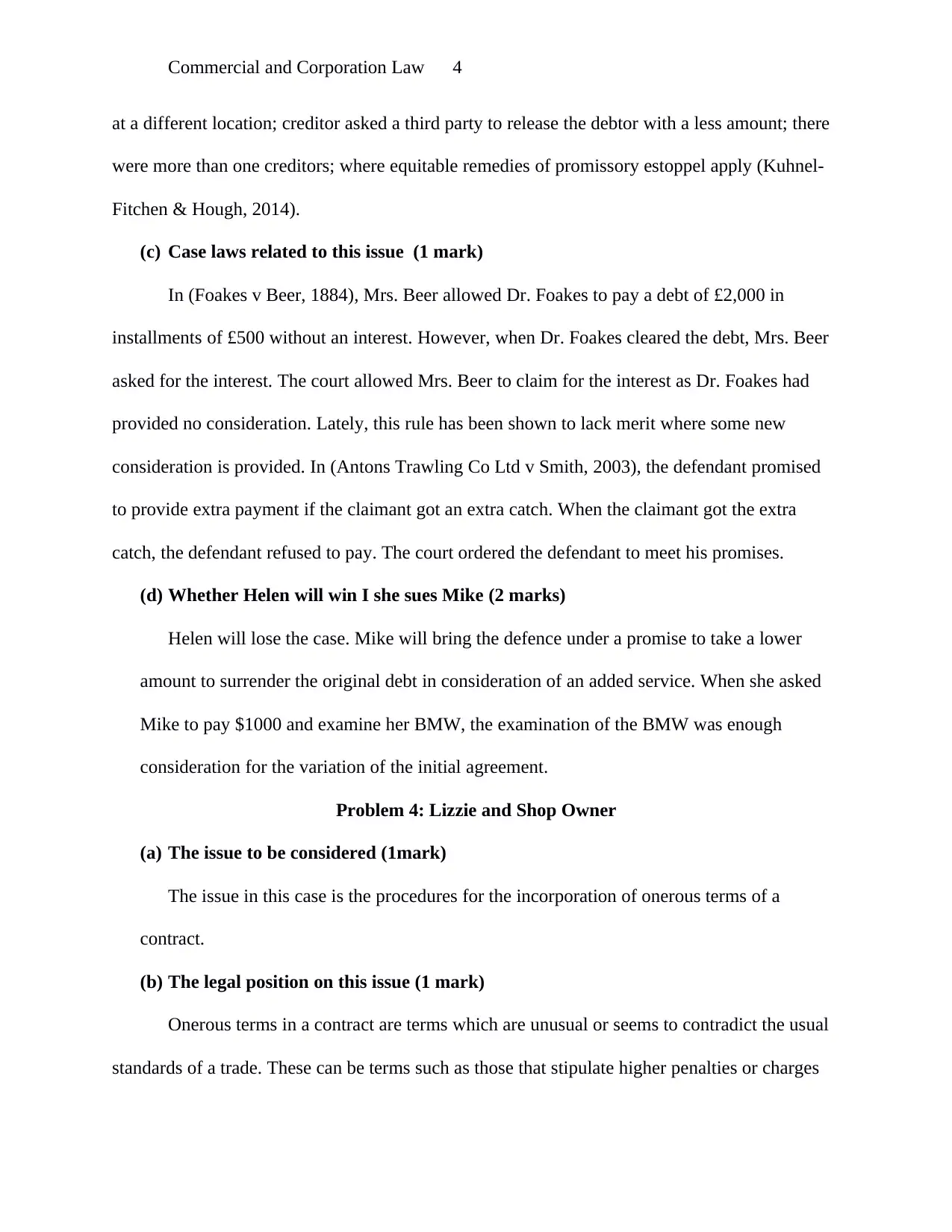
Commercial and Corporation Law 4
at a different location; creditor asked a third party to release the debtor with a less amount; there
were more than one creditors; where equitable remedies of promissory estoppel apply (Kuhnel-
Fitchen & Hough, 2014).
(c) Case laws related to this issue (1 mark)
In (Foakes v Beer, 1884), Mrs. Beer allowed Dr. Foakes to pay a debt of £2,000 in
installments of £500 without an interest. However, when Dr. Foakes cleared the debt, Mrs. Beer
asked for the interest. The court allowed Mrs. Beer to claim for the interest as Dr. Foakes had
provided no consideration. Lately, this rule has been shown to lack merit where some new
consideration is provided. In (Antons Trawling Co Ltd v Smith, 2003), the defendant promised
to provide extra payment if the claimant got an extra catch. When the claimant got the extra
catch, the defendant refused to pay. The court ordered the defendant to meet his promises.
(d) Whether Helen will win I she sues Mike (2 marks)
Helen will lose the case. Mike will bring the defence under a promise to take a lower
amount to surrender the original debt in consideration of an added service. When she asked
Mike to pay $1000 and examine her BMW, the examination of the BMW was enough
consideration for the variation of the initial agreement.
Problem 4: Lizzie and Shop Owner
(a) The issue to be considered (1mark)
The issue in this case is the procedures for the incorporation of onerous terms of a
contract.
(b) The legal position on this issue (1 mark)
Onerous terms in a contract are terms which are unusual or seems to contradict the usual
standards of a trade. These can be terms such as those that stipulate higher penalties or charges
at a different location; creditor asked a third party to release the debtor with a less amount; there
were more than one creditors; where equitable remedies of promissory estoppel apply (Kuhnel-
Fitchen & Hough, 2014).
(c) Case laws related to this issue (1 mark)
In (Foakes v Beer, 1884), Mrs. Beer allowed Dr. Foakes to pay a debt of £2,000 in
installments of £500 without an interest. However, when Dr. Foakes cleared the debt, Mrs. Beer
asked for the interest. The court allowed Mrs. Beer to claim for the interest as Dr. Foakes had
provided no consideration. Lately, this rule has been shown to lack merit where some new
consideration is provided. In (Antons Trawling Co Ltd v Smith, 2003), the defendant promised
to provide extra payment if the claimant got an extra catch. When the claimant got the extra
catch, the defendant refused to pay. The court ordered the defendant to meet his promises.
(d) Whether Helen will win I she sues Mike (2 marks)
Helen will lose the case. Mike will bring the defence under a promise to take a lower
amount to surrender the original debt in consideration of an added service. When she asked
Mike to pay $1000 and examine her BMW, the examination of the BMW was enough
consideration for the variation of the initial agreement.
Problem 4: Lizzie and Shop Owner
(a) The issue to be considered (1mark)
The issue in this case is the procedures for the incorporation of onerous terms of a
contract.
(b) The legal position on this issue (1 mark)
Onerous terms in a contract are terms which are unusual or seems to contradict the usual
standards of a trade. These can be terms such as those that stipulate higher penalties or charges
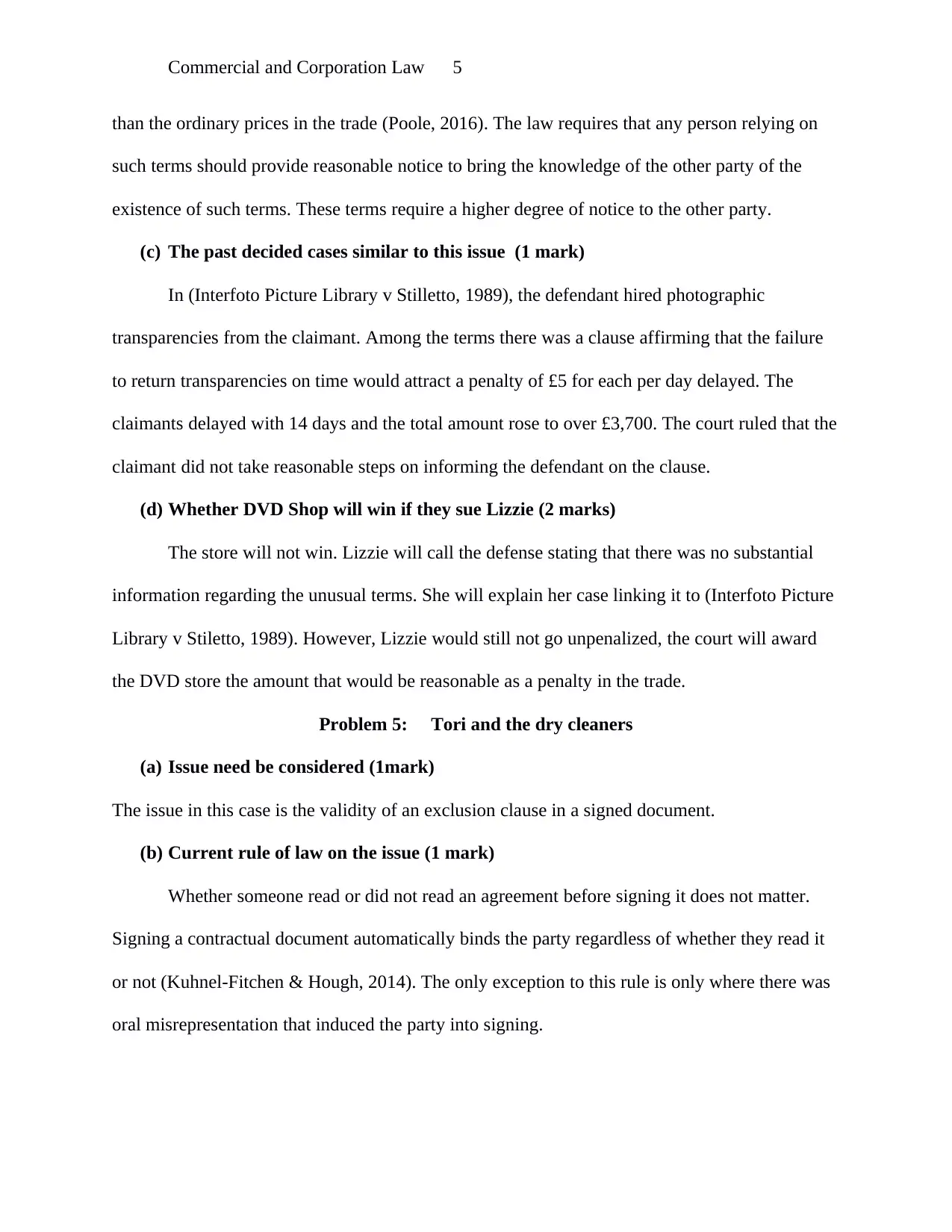
Commercial and Corporation Law 5
than the ordinary prices in the trade (Poole, 2016). The law requires that any person relying on
such terms should provide reasonable notice to bring the knowledge of the other party of the
existence of such terms. These terms require a higher degree of notice to the other party.
(c) The past decided cases similar to this issue (1 mark)
In (Interfoto Picture Library v Stilletto, 1989), the defendant hired photographic
transparencies from the claimant. Among the terms there was a clause affirming that the failure
to return transparencies on time would attract a penalty of £5 for each per day delayed. The
claimants delayed with 14 days and the total amount rose to over £3,700. The court ruled that the
claimant did not take reasonable steps on informing the defendant on the clause.
(d) Whether DVD Shop will win if they sue Lizzie (2 marks)
The store will not win. Lizzie will call the defense stating that there was no substantial
information regarding the unusual terms. She will explain her case linking it to (Interfoto Picture
Library v Stiletto, 1989). However, Lizzie would still not go unpenalized, the court will award
the DVD store the amount that would be reasonable as a penalty in the trade.
Problem 5: Tori and the dry cleaners
(a) Issue need be considered (1mark)
The issue in this case is the validity of an exclusion clause in a signed document.
(b) Current rule of law on the issue (1 mark)
Whether someone read or did not read an agreement before signing it does not matter.
Signing a contractual document automatically binds the party regardless of whether they read it
or not (Kuhnel-Fitchen & Hough, 2014). The only exception to this rule is only where there was
oral misrepresentation that induced the party into signing.
than the ordinary prices in the trade (Poole, 2016). The law requires that any person relying on
such terms should provide reasonable notice to bring the knowledge of the other party of the
existence of such terms. These terms require a higher degree of notice to the other party.
(c) The past decided cases similar to this issue (1 mark)
In (Interfoto Picture Library v Stilletto, 1989), the defendant hired photographic
transparencies from the claimant. Among the terms there was a clause affirming that the failure
to return transparencies on time would attract a penalty of £5 for each per day delayed. The
claimants delayed with 14 days and the total amount rose to over £3,700. The court ruled that the
claimant did not take reasonable steps on informing the defendant on the clause.
(d) Whether DVD Shop will win if they sue Lizzie (2 marks)
The store will not win. Lizzie will call the defense stating that there was no substantial
information regarding the unusual terms. She will explain her case linking it to (Interfoto Picture
Library v Stiletto, 1989). However, Lizzie would still not go unpenalized, the court will award
the DVD store the amount that would be reasonable as a penalty in the trade.
Problem 5: Tori and the dry cleaners
(a) Issue need be considered (1mark)
The issue in this case is the validity of an exclusion clause in a signed document.
(b) Current rule of law on the issue (1 mark)
Whether someone read or did not read an agreement before signing it does not matter.
Signing a contractual document automatically binds the party regardless of whether they read it
or not (Kuhnel-Fitchen & Hough, 2014). The only exception to this rule is only where there was
oral misrepresentation that induced the party into signing.
⊘ This is a preview!⊘
Do you want full access?
Subscribe today to unlock all pages.

Trusted by 1+ million students worldwide
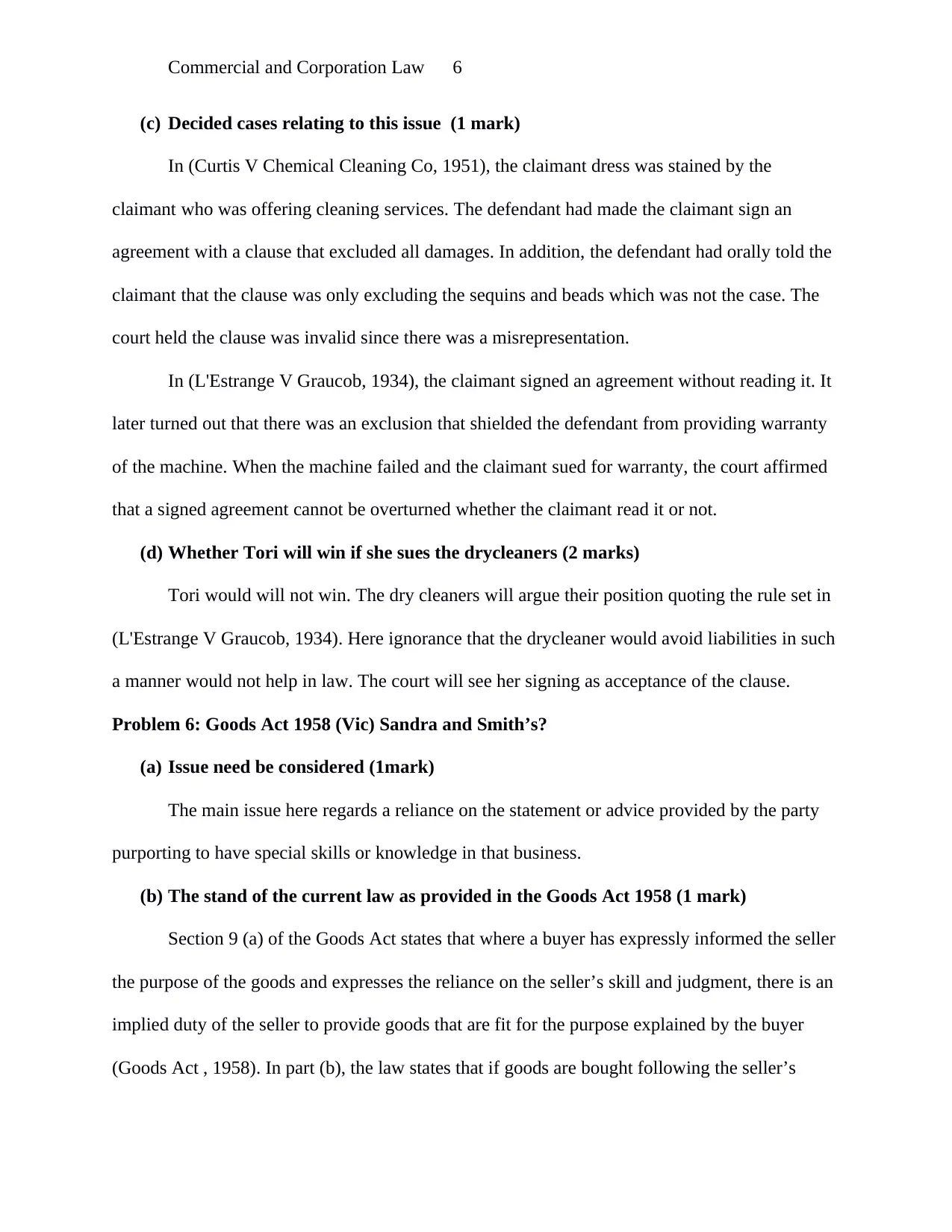
Commercial and Corporation Law 6
(c) Decided cases relating to this issue (1 mark)
In (Curtis V Chemical Cleaning Co, 1951), the claimant dress was stained by the
claimant who was offering cleaning services. The defendant had made the claimant sign an
agreement with a clause that excluded all damages. In addition, the defendant had orally told the
claimant that the clause was only excluding the sequins and beads which was not the case. The
court held the clause was invalid since there was a misrepresentation.
In (L'Estrange V Graucob, 1934), the claimant signed an agreement without reading it. It
later turned out that there was an exclusion that shielded the defendant from providing warranty
of the machine. When the machine failed and the claimant sued for warranty, the court affirmed
that a signed agreement cannot be overturned whether the claimant read it or not.
(d) Whether Tori will win if she sues the drycleaners (2 marks)
Tori would will not win. The dry cleaners will argue their position quoting the rule set in
(L'Estrange V Graucob, 1934). Here ignorance that the drycleaner would avoid liabilities in such
a manner would not help in law. The court will see her signing as acceptance of the clause.
Problem 6: Goods Act 1958 (Vic) Sandra and Smith’s?
(a) Issue need be considered (1mark)
The main issue here regards a reliance on the statement or advice provided by the party
purporting to have special skills or knowledge in that business.
(b) The stand of the current law as provided in the Goods Act 1958 (1 mark)
Section 9 (a) of the Goods Act states that where a buyer has expressly informed the seller
the purpose of the goods and expresses the reliance on the seller’s skill and judgment, there is an
implied duty of the seller to provide goods that are fit for the purpose explained by the buyer
(Goods Act , 1958). In part (b), the law states that if goods are bought following the seller’s
(c) Decided cases relating to this issue (1 mark)
In (Curtis V Chemical Cleaning Co, 1951), the claimant dress was stained by the
claimant who was offering cleaning services. The defendant had made the claimant sign an
agreement with a clause that excluded all damages. In addition, the defendant had orally told the
claimant that the clause was only excluding the sequins and beads which was not the case. The
court held the clause was invalid since there was a misrepresentation.
In (L'Estrange V Graucob, 1934), the claimant signed an agreement without reading it. It
later turned out that there was an exclusion that shielded the defendant from providing warranty
of the machine. When the machine failed and the claimant sued for warranty, the court affirmed
that a signed agreement cannot be overturned whether the claimant read it or not.
(d) Whether Tori will win if she sues the drycleaners (2 marks)
Tori would will not win. The dry cleaners will argue their position quoting the rule set in
(L'Estrange V Graucob, 1934). Here ignorance that the drycleaner would avoid liabilities in such
a manner would not help in law. The court will see her signing as acceptance of the clause.
Problem 6: Goods Act 1958 (Vic) Sandra and Smith’s?
(a) Issue need be considered (1mark)
The main issue here regards a reliance on the statement or advice provided by the party
purporting to have special skills or knowledge in that business.
(b) The stand of the current law as provided in the Goods Act 1958 (1 mark)
Section 9 (a) of the Goods Act states that where a buyer has expressly informed the seller
the purpose of the goods and expresses the reliance on the seller’s skill and judgment, there is an
implied duty of the seller to provide goods that are fit for the purpose explained by the buyer
(Goods Act , 1958). In part (b), the law states that if goods are bought following the seller’s
Paraphrase This Document
Need a fresh take? Get an instant paraphrase of this document with our AI Paraphraser
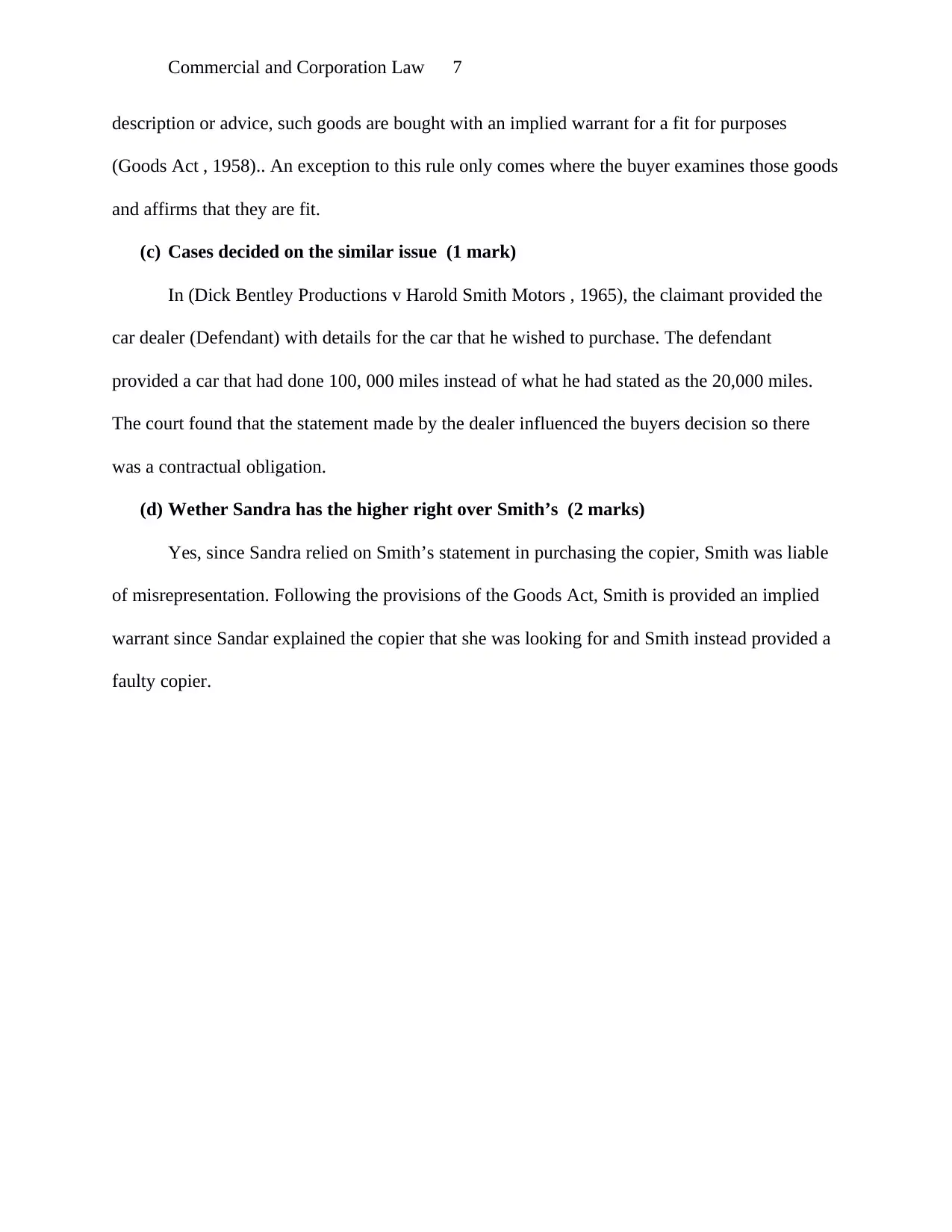
Commercial and Corporation Law 7
description or advice, such goods are bought with an implied warrant for a fit for purposes
(Goods Act , 1958).. An exception to this rule only comes where the buyer examines those goods
and affirms that they are fit.
(c) Cases decided on the similar issue (1 mark)
In (Dick Bentley Productions v Harold Smith Motors , 1965), the claimant provided the
car dealer (Defendant) with details for the car that he wished to purchase. The defendant
provided a car that had done 100, 000 miles instead of what he had stated as the 20,000 miles.
The court found that the statement made by the dealer influenced the buyers decision so there
was a contractual obligation.
(d) Wether Sandra has the higher right over Smith’s (2 marks)
Yes, since Sandra relied on Smith’s statement in purchasing the copier, Smith was liable
of misrepresentation. Following the provisions of the Goods Act, Smith is provided an implied
warrant since Sandar explained the copier that she was looking for and Smith instead provided a
faulty copier.
description or advice, such goods are bought with an implied warrant for a fit for purposes
(Goods Act , 1958).. An exception to this rule only comes where the buyer examines those goods
and affirms that they are fit.
(c) Cases decided on the similar issue (1 mark)
In (Dick Bentley Productions v Harold Smith Motors , 1965), the claimant provided the
car dealer (Defendant) with details for the car that he wished to purchase. The defendant
provided a car that had done 100, 000 miles instead of what he had stated as the 20,000 miles.
The court found that the statement made by the dealer influenced the buyers decision so there
was a contractual obligation.
(d) Wether Sandra has the higher right over Smith’s (2 marks)
Yes, since Sandra relied on Smith’s statement in purchasing the copier, Smith was liable
of misrepresentation. Following the provisions of the Goods Act, Smith is provided an implied
warrant since Sandar explained the copier that she was looking for and Smith instead provided a
faulty copier.
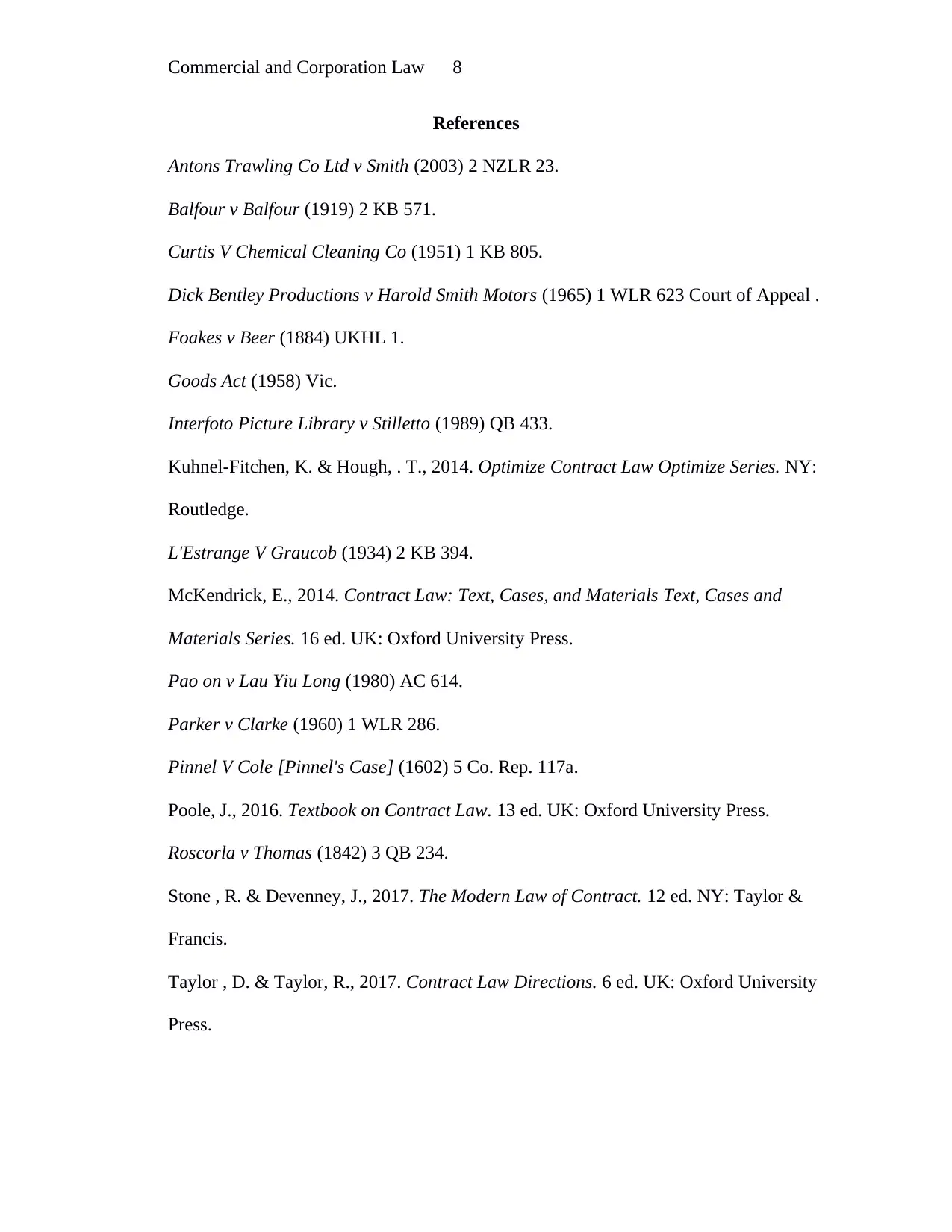
Commercial and Corporation Law 8
References
Antons Trawling Co Ltd v Smith (2003) 2 NZLR 23.
Balfour v Balfour (1919) 2 KB 571.
Curtis V Chemical Cleaning Co (1951) 1 KB 805.
Dick Bentley Productions v Harold Smith Motors (1965) 1 WLR 623 Court of Appeal .
Foakes v Beer (1884) UKHL 1.
Goods Act (1958) Vic.
Interfoto Picture Library v Stilletto (1989) QB 433.
Kuhnel-Fitchen, K. & Hough, . T., 2014. Optimize Contract Law Optimize Series. NY:
Routledge.
L'Estrange V Graucob (1934) 2 KB 394.
McKendrick, E., 2014. Contract Law: Text, Cases, and Materials Text, Cases and
Materials Series. 16 ed. UK: Oxford University Press.
Pao on v Lau Yiu Long (1980) AC 614.
Parker v Clarke (1960) 1 WLR 286.
Pinnel V Cole [Pinnel's Case] (1602) 5 Co. Rep. 117a.
Poole, J., 2016. Textbook on Contract Law. 13 ed. UK: Oxford University Press.
Roscorla v Thomas (1842) 3 QB 234.
Stone , R. & Devenney, J., 2017. The Modern Law of Contract. 12 ed. NY: Taylor &
Francis.
Taylor , D. & Taylor, R., 2017. Contract Law Directions. 6 ed. UK: Oxford University
Press.
References
Antons Trawling Co Ltd v Smith (2003) 2 NZLR 23.
Balfour v Balfour (1919) 2 KB 571.
Curtis V Chemical Cleaning Co (1951) 1 KB 805.
Dick Bentley Productions v Harold Smith Motors (1965) 1 WLR 623 Court of Appeal .
Foakes v Beer (1884) UKHL 1.
Goods Act (1958) Vic.
Interfoto Picture Library v Stilletto (1989) QB 433.
Kuhnel-Fitchen, K. & Hough, . T., 2014. Optimize Contract Law Optimize Series. NY:
Routledge.
L'Estrange V Graucob (1934) 2 KB 394.
McKendrick, E., 2014. Contract Law: Text, Cases, and Materials Text, Cases and
Materials Series. 16 ed. UK: Oxford University Press.
Pao on v Lau Yiu Long (1980) AC 614.
Parker v Clarke (1960) 1 WLR 286.
Pinnel V Cole [Pinnel's Case] (1602) 5 Co. Rep. 117a.
Poole, J., 2016. Textbook on Contract Law. 13 ed. UK: Oxford University Press.
Roscorla v Thomas (1842) 3 QB 234.
Stone , R. & Devenney, J., 2017. The Modern Law of Contract. 12 ed. NY: Taylor &
Francis.
Taylor , D. & Taylor, R., 2017. Contract Law Directions. 6 ed. UK: Oxford University
Press.
⊘ This is a preview!⊘
Do you want full access?
Subscribe today to unlock all pages.

Trusted by 1+ million students worldwide
1 out of 9
Related Documents
Your All-in-One AI-Powered Toolkit for Academic Success.
+13062052269
info@desklib.com
Available 24*7 on WhatsApp / Email
![[object Object]](/_next/static/media/star-bottom.7253800d.svg)
Unlock your academic potential
Copyright © 2020–2026 A2Z Services. All Rights Reserved. Developed and managed by ZUCOL.



